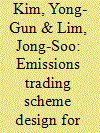| Srl | Item |
| 1 |
ID:
166479


|
|
|
|
|
| Summary/Abstract |
In this paper, we analyzed the competitiveness of an open-cycle gas turbine (OCGT) in the Korean electricity market and found reasons why OCGT has not been constructed since 2001, when the market opened. Through the analysis, we found that OCGT was weak in the Korean electricity market due to 3 factors: high load factor, high price of liquefied natural gas, and existing inefficient power plants. Using the conformity theory of the optimum in resource planning and the equilibrium in market dynamics, we verified the reasons by implementing resource planning using the Wien Automatic System Planning (WASP)-Ⅳ package with actual market data for the 16 years from 2001 to 2016. In addition, considering the new energy policy of Korea, shifting main sources of electricity generation from nuclear and coal to clean renewable energies and natural gas, we analyzed the competitiveness of OCGT in the future Korean electricity market. We identified the factors unfavorable for OCGT in the current market and suggested what should be changed to cope with high renewable energy penetration.
|
|
|
|
|
|
|
|
|
|
|
|
|
|
|
|
| 2 |
ID:
136195


|
|
|
|
|
| Summary/Abstract |
The electricity market, monopolistic in nature, with government price regulation, poses a serious challenge for policy makers with respect to the cost-effectiveness of emissions trading, particularly in Asian countries. This paper argues that a cap-and-trade regulatory system for indirect emissions combined with a rate-based allocation system for direct emissions can achieve market efficiency even in the presence of price and quantity controls in the electricity market. This particular policy mix could provide appropriate incentives for industries to reduce their electricity consumption while inducing power producers to reduce their direct carbon emissions cost-effectively in conditions where there is strict government control of electricity prices. Another advantage of the suggested policy mix is that it allows carbon leakage in cross-border power trades to be effectively eliminated.
|
|
|
|
|
|
|
|
|
|
|
|
|
|
|
|